Canadian Mennonite women were among millions who peacefully made their voices heard for justice, equality and a host of social causes at the Women’s Marches that took place across Canada and every continent on January 21, 2017, the day following the Donald Trump inauguration.
Some even made it all the way to Washington, D.C., where hundreds of Mennonites arrived in buses, by plane, train and car to join in a massive, peaceful gathering estimated at more than half a million, which far exceeded expectations and led to human gridlock in the core area of the city.
Thea Armstrong, 15, who attends Breslau (Ont.) Mennonite Church, asked for the trip as a Christmas present and travelled by car with her mother, Rockway Mennonite Collegiate teacher Marlys Neufeldt, and sister Siena, 17. The group was invited to stay in the home of a member of the Mennonite-affiliated Washington Community Fellowship Church, after connecting through a Facebook group called Mennonites at the Women’s March in Washington.
“It was important to me, as someone who’s going to be affected [by social justice issues raised by the U.S. election] for the rest of my life, even living in Canada, because Canada is so close to the U.S.,” Thea said after the march. “I found it to be really unifying. I loved the number of people that showed up—that was really awesome, that there were so many people so committed. I found it to be really empowering to be surrounded by people who were all worried about the future and taking a stand and not being silenced.”
Speakers included an “intersectional” diversity of voices not often heard in the mainstream, Siena said, everyone from kids worried about their immigrant parents being deported, to Muslim women; Palestinian, Hispanic and Native Americans; environmentalists; sexual abuse survivors; transgender people; black women who’d seen their sons killed by police, and many others fearful of dark forces the Trump election seems to have unleashed in the public mindset.
“There were some celebrities, but there were a lot of people who don’t have such a mainstream voice,” she said. There were also lots of supportive men, of all races, sharing the message of working together for a more just, peaceful, loving and equitable society.
“I was really glad that my daughter encouraged me to go, not just to a closer city but the one that was at the nucleus of the power change, and to use our power to confront the power in government and present an alternative message of peace and equity for all,” said Neufeldt. She explained that having once lived in the U.S. for almost three years and having many American friends added to her sense of connection. “The fact that marches were going on in cities all around the world was really empowering; it felt almost like a new wave of feminism.
“I’m really inspired and encouraged by my daughters that they wanted to be part of this, and I want to encourage them to become young activists, which they already are,” she added.
Wendy Chapell-Dick of Bluffton, Ohio, who created the Mennonite women’s Facebook group, was instrumental in helping participants communicate with each other and organize buses and accommodation, although in the end the hope of marching as one group was thwarted by the sheer size of the crowds and jammed cellphone signals.
Buses were organized from Bluffton, Ohio; Lancaster, Pa.; Harrisonburg, Va.; Goshen, Ind.; and other cities with large Mennonite populations. Many other participants came on their own.
“I’m sure there were several hundred (at the march), but there was no way we could find each other because we couldn’t move!” Chappell-Dick said, reflecting on what proved to be a difficult, yet exciting and historic day. Being Mennonite, it came naturally for some of the group to spend an hour at the gathering point singing together before going to the rally site—songs like “The Journey is Long” and “Over My Head”—to appreciative response and participation from the crowds flowing around them.
“It was heartwarming,” Chappell-Dick said. “It wasn’t all of the group, but it was enough that we could make some noise.”
Despite the difficulties of the day, she was pleasantly surprised with the turnout. “I think the fact that so many came says a lot about Mennonite women that we need to pay attention to. Not just women who came here, but to sister marches. And the women who knit us these caps”—the pink hats that became a cheeky staple of the marches. “I received three boxes in the mail from Mennonite women who were knitting these hats. Over 20 women came to me to offer money to help others go, Mennonite women. It touched something. Somehow it was important to us and struck a chord.”
Speaker after speaker on the four-hour program reflected on the need to do more than just march or hit “send,” urging participants to go home and work for the good of their communities, to organize for better political solutions and to overcome prejudice, injustice, misogyny and oppression of marginalized people with loving action. One indication of the positive, affirming atmosphere among the enormous crowd was the fact that police didn’t make a single arrest throughout the long day.
Melanie Penner, an autism clinician investigator who teaches at the University of Toronto and attends Toronto United Mennonite Church, flew to Washington to attend the march and thought about how Mennonites need to take seriously the voices of marginalized people, even when they make us uncomfortable.
“I felt so proud to have participated in the Women’s March,” she said in a written reflection later. “The Mennonite in me was happy to affirm the value of non-violent resistance. ‘Congratulations, you!’ I told myself. And then I returned home and returned to social media. I read about how women of colour were treated at the march, being told they weren’t being inclusive enough for reminding people that the majority of white women voted for the current president of the United States.”
Penner writes, “I did not see any police in riot gear in Washington, and hardly saw any police at all. I did not have to choose non-violence; non-violence chose me because I am white, and the majority of people marching were also white.
“Like the march, our composition as Mennonites is largely white. Though our shared history is one of being outsiders and oppressed, those of us with white skin now enjoy the privilege that goes along with it. A look through the Beatitudes is a reminder of this. It is time to give the blessed ones—the mourning, the persecuted, the reviled—their time on the platform. If they do not have a platform, we must build it for them and lift them up to the microphone. If they tell us we are wrong, we must humbly repent. We will not back down; we will clear the way,” Penner wrote.
Being able to march behind a “Mennonites” banner with a group whose messages reflected an Anabaptist perspective was great, Thea Armstrong said. “A lot of the signs [carried in the march] were kind of contradictory to the idea of fighting hatred with peace and love, and marching with Mennonites was very affirmative of being kind and taking a stance in a nonviolent way.”
Among the many positive messages hoisted high by the Mennonite group were the popular trilingual “We’re glad you’re our neighbor” signs.
“It was cool being with a group that shares your views on how to bring about change, in a peaceful and loving way,” Siena Armstrong added. “And to get to know people who are from a different country than you. They were so happy to see you, which was really cool. And it was such a huge group of people united in this one cause. . . . Especially being in Washington, it felt more effective, maybe. To be in the place where the inauguration had just happened. We could see the ‘aftermath’ of it.”
Chappell-Dick says she hopes the Facebook group continues to be a place to share experiences and responses to the marches, and “to become even a more real connection than we managed to create here.”
—Corrected Jan. 25, 2017
For perspectives from the U. S. see:
Mennonites join Women’s March on Washington (Mennonite World Review)
Mennonites join the Women’s March on Washington (The Mennonite)


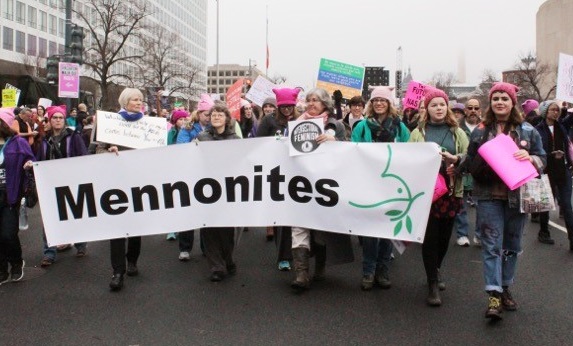

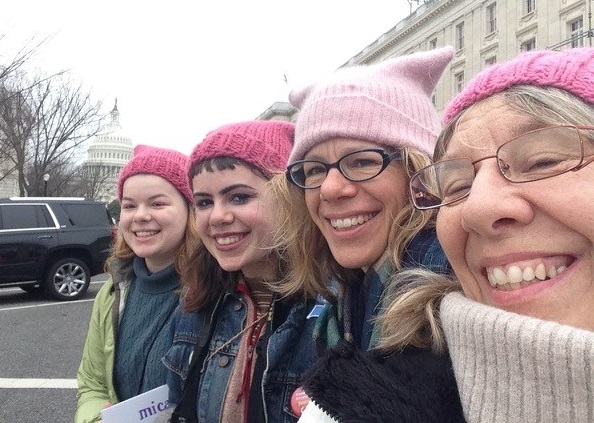
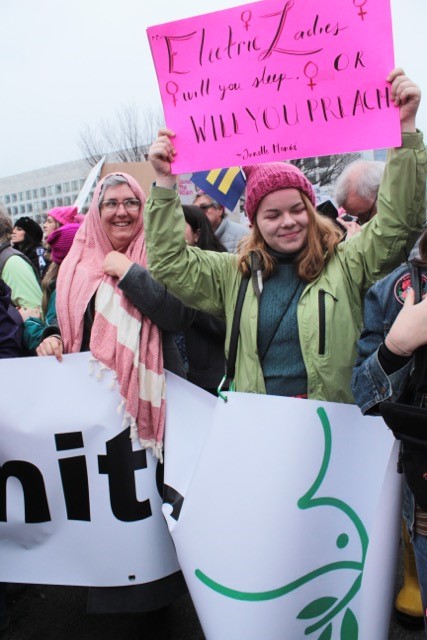
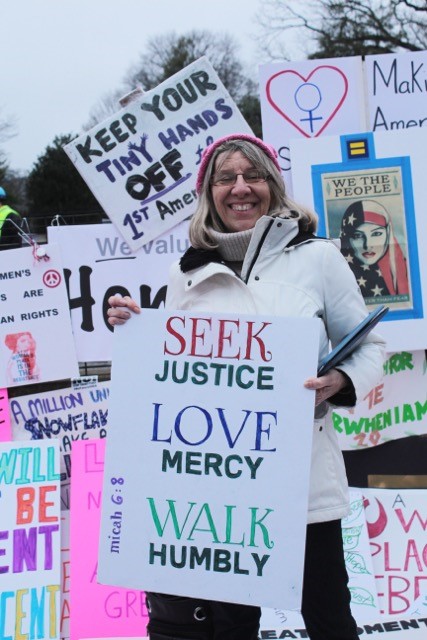
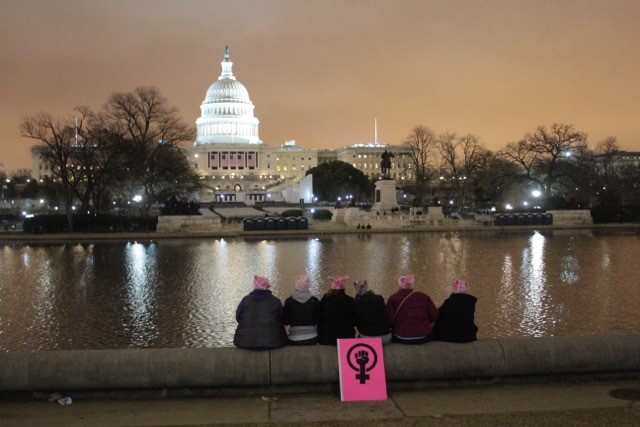
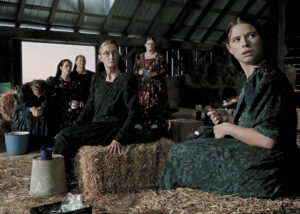



Leave a Reply
You must be logged in to post a comment.